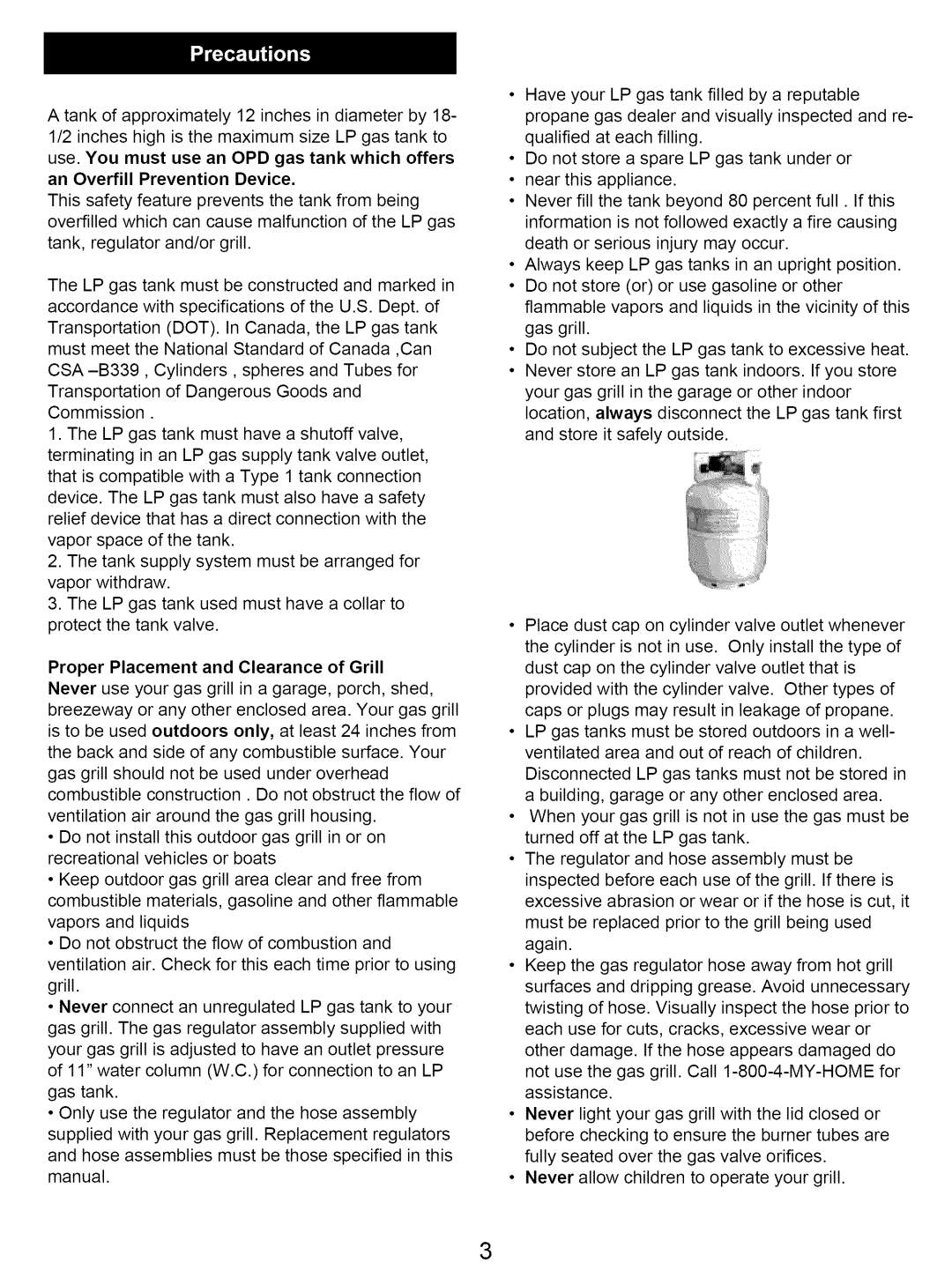
A tankof approximately12inchesindiameterby18- 1/2incheshighisthemaximumsizeLPgastankto use.Youmustusean OPDgastankwhichoffers
an Overfill Prevention Device.
This safety feature prevents the tank from being overfilled which can cause malfunction of the LP gas tank, regulator and/or grill.
The LP gas tank must be constructed and marked in accordance with specifications of the U.S. Dept. of Transportation (DOT). In Canada, the LP gas tank must meet the National Standard of Canada ,Can CSA
Transportation of Dangerous Goods and Commission.
1.The LP gas tank must have a shutoff valve, terminating in an LP gas supply tank valve outlet, that is compatible with a Type 1 tank connection
device. The LP gas tank must also have a safety relief device that has a direct connection with the
vapor space of the tank.
2.The tank supply system must be arranged for vapor withdraw.
3.The LP gas tank used must have a collar to protect the tank valve.
Proper Placement and Clearance of Grill Never use your gas grill in a garage, porch, shed, breezeway or any other enclosed area. Your gas grill is to be used outdoors only, at least 24 inches from the back and side of any combustible surface. Your
gas grill should not be used under overhead combustible construction. Do not obstruct the flow of
ventilation air around the gas grill housing.
•Do not install this outdoor gas grill in or on recreational vehicles or boats
•Keep outdoor gas grill area clear and free from combustible materials, gasoline and other flammable
vapors and liquids
• Do not obstruct the flow of combustion and ventilation air. Check for this each time prior to using grill.
•Never connect an unregulated LP gas tank to your gas grill. The gas regulator assembly supplied with your gas grill is adjusted to have an outlet pressure of 11" water column (W.C.) for connection to an LP gas tank.
•Only use the regulator and the hose assembly supplied with your gas grill. Replacement regulators
and hose assemblies must be those specified in this manual.
•Have your LP gas tank filled by a reputable propane gas dealer and visually inspected and re- qualified at each filling.
•Do not store a spare LP gas tank under or
•near this appliance.
•Never fill the tank beyond 80 percent full. If this information is not followed exactly a fire causing death or serious injury may occur.
•Always keep LP gas tanks in an upright position.
•Do not store (or) or use gasoline or other flammable vapors and liquids in the vicinity of this gas grill.
•Do not subject the LP gas tank to excessive heat.
•Never store an LP gas tank indoors. If you store your gas grill in the garage or other indoor location, always disconnect the LP gas tank first and store it safely outside.
•Place dust cap on cylinder valve outlet whenever the cylinder is not in use. Only install the type of dust cap on the cylinder valve outlet that is provided with the cylinder valve. Other types of caps or plugs may result in leakage of propane.
•LP gas tanks must be stored outdoors in a well- ventilated area and out of reach of children. Disconnected LP gas tanks must not be stored in a building, garage or any other enclosed area.
•When your gas grill is not in use the gas must be turned off at the LP gas tank.
•The regulator and hose assembly must be inspected before each use of the grill. If there is excessive abrasion or wear or if the hose is cut, it must be replaced prior to the grill being used again.
•Keep the gas regulator hose away from hot grill surfaces and dripping grease. Avoid unnecessary twisting of hose. Visually inspect the hose prior to each use for cuts, cracks, excessive wear or other damage. If the hose appears damaged do not use the gas grill. Call
•Never light your gas grill with the lid closed or before checking to ensure the burner tubes are fully seated over the gas valve orifices.
•Never allow children to operate your grill.
3
